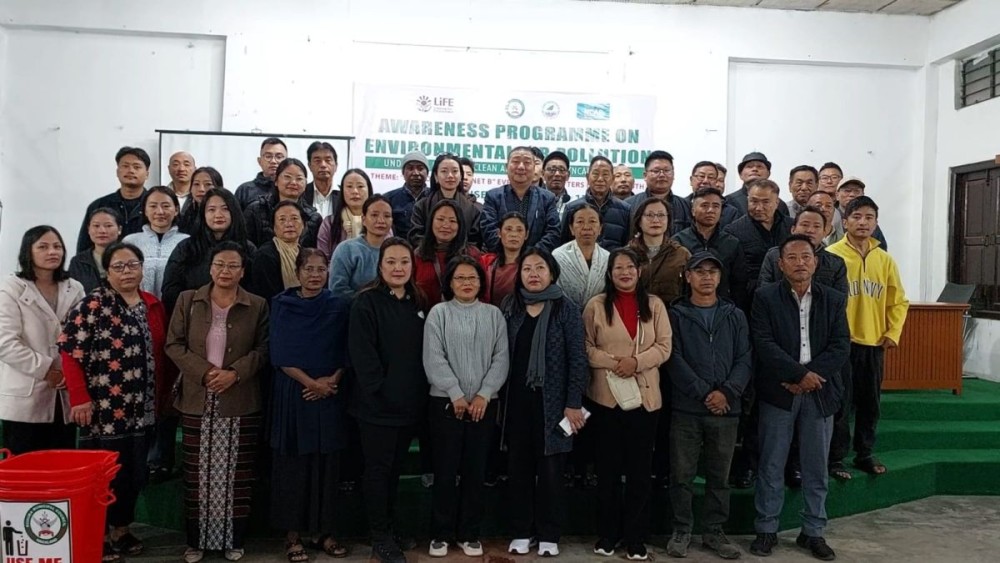Resource persons with Khrielievi Chiisi and others during awareness programme on environmental air pollution on November 13.

Kohima, November 13 (MExN): The Ward No. 17 of the Kohima Municipal Council (KMC) organised an awareness programme on Environmental Air Pollution under National Clean Air Programme (NCAP) 2024-25 with the theme “Act Now: No Planet B” Every Choice Matters for our Earth” at Forest Colony, Kohima.
The event held on November 13, aimed to highlight the growing concern of air pollution and its direct impact on human health and the environment.
Rongsenben Longkumer, Junior Scientific Assistant, Nagaland Pollution Control Board, delivered a presentation on “Ambient Air Quality and Its Impact.”
She explained that air pollution refers to the presence of harmful substances in the atmosphere that affect the health of living beings and the environment. The major pollutants include particulate matter (PM₁₀ and PM₂.₅) and gaseous pollutants such as nitrogen dioxide, sulphur dioxide, carbon monoxide, and ozone.
In the context of Nagaland, it was highlighted the major sources contributing to ambient air pollution, which include road dust, vehicular emissions, construction and demolition activities, stone crushers, brick kilns, wood-based industries, and domestic firewood burning. Although Nagaland does not have large-scale industries, these smaller but widespread sources have a cumulative impact on air quality.
The Nagaland Pollution Control Board has been monitoring the air quality status in Dimapur and Kohima under the National Air Monitoring Programme (NAMP) for over a decade and has recently extended monitoring to other districts from 2024. Data from Kohima show that while there was a decline in pollution levels after 2020, there has been a gradual increase again; from an annual average of 77 µg/m³ in 2023 to 78 µg/m³ in 2024, indicating fluctuations in air quality trends.
Longkumer particularly emphasized that open burning of waste in residential and public areas remains a major contributor to poor air quality in Nagaland. Despite clear directives under the Plastic Waste Management Rules, 2016, which mandate local bodies such as councils, wards, and gram panchayats to restrict open burning of waste, such practices continue to persist. The National Green Tribunal (NGT) has also issued orders to penalize individuals and institutions found engaging in open burning, recognizing its serious health and environmental implications.
She urged citizens to adopt responsible waste management practices such as segregation of waste at source, composting of biodegradable waste, and proper disposal through authorized collection systems to collectively improve the air quality of Nagaland.
Y Hanpong Konyak, Junior Scientific Assistant, Nagaland Pollution Control Board spoke on the topic “Lifestyle for Environment.”
Earlier, welcome address was delivered by Khrielievi Chiisi, Deputy Chairman, KMC. Peter K. Rengma Chairman, Forest Colony Council chaired the programme while vote of thanks was proposed by Nzinimo Lotha.






